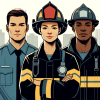For those who are not old enough to become a volunteer or paid firefighter, one avenue to consider is an Explorer Firefighter program. Some fire departments and ambulance companies have established programs that are an extension of the Boy Scouts of America.
Explorer Programs are often open to those between 16 and 21 years old. The age range can vary by department, with 14 to 18 years old also common.
Many firefighters, like me, started out as Explorers. Although I was older than 18, I was able to be an associate advisor for the Alameda (Calif.) Fire Explorer Post 689. This enabled me to gain fire service experience for my resume.
It also allowed me to practice the skills I learned in the Chabot College Firefighter 1 academy. It is common for graduates to forget much of what they learned in an academy if they don’t regularly practice those skills.
Not every fire department has an Explorer Post, but if you can find one and are of the appropriate age, it is a great way to get your foot in the door and get some experience on your resume.
As an Explorer, don’t expect to fight fire and be in the thick of the action. Most Explorers are simply observers, due to the amount of liability involved.
However, don’t let that discourage you; it’s experience and better than nothing.
Best behavior
Since Explorers are still typically in middle or high school (based on their age), the requirements to continue to be an Explorer are usually pretty minimal. There may be weekly or monthly meetings or drill sessions to attend at night or on weekends.
The cost is usually minimal too — about $8 for the Boy Scouts of America fee, maybe a small fee to cover incidental expenses, and then the cost of a basic uniform: Explorer T-shirt, tactical pants, black shoes, etc.
Becoming an Explorer may lead to other opportunities if you play your cards right. Just like being a volunteer firefighter, being an Explorer gives you a 50-50 chance at succeeding in that department.
Why?
Because now we get to know you; we get to know the real you. Many candidates think becoming an Explorer or volunteer gives them a guaranteed spot once a full-time position opens up.
The good part about being an Explorer or a volunteer is that we get to know you. The bad part is that we get to know you.
That means that if you are someone we want to have work for us and whom we think will fit into our culture, great. But, if we don’t like what we’ve seen you do as an Explorer or volunteer, you’ve just shot yourself in the foot.
Remember, the best predictor of future behavior is past behavior.


